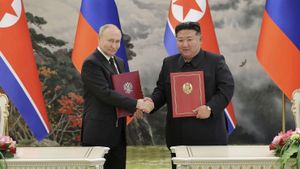The Democratic Party finds itself at a crossroads as the 119th Congress commences, with its internal dynamics reflecting deep ideological divides. The recent election of Rep. Brad Schneider as chair of the New Democrat Coalition—an influential group within the party—spotlights the balancing act required to engage both moderates and progressives. Schneider defeated Rep. Sharice Davids of Kansas, promoting his commitment to collaboration and bipartisanship, especially as the nation braces for another round of governance under former President Donald Trump.
Schneider's history of political tenacity, having reclaimed his district seat after losing it briefly, showcases his resilience. He aims to steer the New Dems toward legislative productivity, asserting the need to stand firm against irresponsible actions from the Republican majority, yet also remain open to compromise. “The most important thing,” he articulated after his election, “is to shine a light on irresponsible actions...but also working together with anyone who is open to solving problems.”
Despite the party’s recent electoral setbacks, the New Democrats have actually gained 23 new members, bucking broad national trends. This growth is significant as the party contemplates strategies to address voter concerns and recalibrate its approach to governance moving forward.
Compounding this issue, recent commentary from political analysts like Thomas B. Edsall highlights historical tension between the left and center of the Democratic Party. Successive defeats since 2016 have incited finger-pointing among factions, with centrists and progressives alike blaming one another for the party's failures at the polls. Such divisions are evident as the party navigates its identity amid fears of alienation among moderate voters who may feel increasingly distanced from progressive ideologies.
The tension is vividly evident through the lens of recent elections, where allegations of racial and social insensitivity toward progressives have led to some voters feeling alienated. The nomination of Kamala Harris added layers of complexity to how the party is perceived—does the embrace of progressive values on race and gender align with the broader electorate's sentiments, or does it push potential supporters away? Given the stark polarization of American politics, this question looms large.
Edsall references commentary from various Democratic insiders post-election, emphasizing the need for the party to recalibrate its approach to issues like immigration, policing, and social equity. The data speaks volumes—various surveys indicate voters have grown tired of the party's leftward drift. For example, disparities between the positions of progressive Democrats and median voter preferences are growing starker, leading some to suggest the party must adopt more centrist strategies to recapture lost ground.
Political scientists echo these sentiments, arguing it may be necessary for Democrats to shed some of their most progressive stances to appeal to moderates. Analyst Sean Westwood remarked on the historical resilience of parties, which adapt to voter needs through ideological shifts. With the stakes potentially higher than ever, moving forward will require astute navigation of these complex currents.
The concerns surrounding the Democratic Party's ideological extremities come to the fore when battling the populist surge led by figures like Trump. His administration's policies galvanized many within the party to push their agendas far left, causing dissonance with mainstream median views, especially on social issues, which need to be acknowledged and debated within the Democratic ranks. This raises the fundamental question: can the party afford to ignore the electorate's shifting values?
Recent discussions within the party reiterate the importance of attending to the views of groups who feel excluded, particularly within the Democratic coalition. How the party recounts its narrative surrounding social issues could be pivotal for its 2024 ambitions, as the upcoming DNC chair selection promises to reflect the party’s internal strife between moderate and progressive factions.
Political operatives are weighing the potential loss of key demographics against the backdrop of progressive agendas. Nick Gourevitch, who played significant roles during past campaigns, ponders the viability of broadly appealing to moderates without alienation. His concern revolves around the ideologies represented within the party and how to create policies reflective of broader constituents, including working-class voters who often feel overlooked.
Despite these challenges, many believe there remains room for the Democratic Party to prosper if it embraces moderation. Lanae Erickson from the centrist think tank Third Way asserts, “Nearly all Democratic voters still prefer winning over ideological purity,” indicating there could be flexibility on cultural issues to create the expansive coalition necessary to defeat right-wing power grabs.
The Democratic Party has often struggled with its dual identity—an embracing and inclusive hemisphere alongside its forward-thinking stance on progressive issues. Moving away from positions perceived as overly liberal could help navigate the treacherous political terrain. The notion is supported by some who see the potential for Democrats to occupy centrist ground, similar to how previous successful administrations transitioned back and away from extreme rhetoric.
With another Trump administration lurking on the horizon, adhering to basic social values tied to the diversity and economic stability of the party could help usher forth the needed victories. The recent election of Schneider implies there is recognition within the party for the necessity to reach out beyond core constituencies, engaging those who previously felt disenfranchised.
This recognition may play out as the DNC chair position is contemplated early next year. With candidates expected to highlight their lone perspectives, the ideological debate at the heart of the party continues to simmer. Will the next leader rally Democrats around centrist policies, or will they fervently embrace the progressive wing's ideals? This question remains to be answered, but one thing is clear—internal resolution and strategy will be pivotal for their future electoral success.
The upcoming Election Day is poised to test the viability of harmonizing these disparate viewpoints within the party as the Democratic leadership draws their strategies for the challenges of the next administration. The tension between progressives' urgent agendas and moderates' caution are branches of the same tree; one hopes to carve out pathways forward. It is through this delicate balance of power and ideology where the Democratic Party's true colors will emerge—or falter.
With the stakes so high, the unity and cohesiveness of the party’s vision will likely define its position on the national stage. Whether the Democratic Party can truly reconcile its factions and marshal momentum ahead will remain to be seen as political analysts and voters alike watch closely for the evolution of its leadership and direction.



